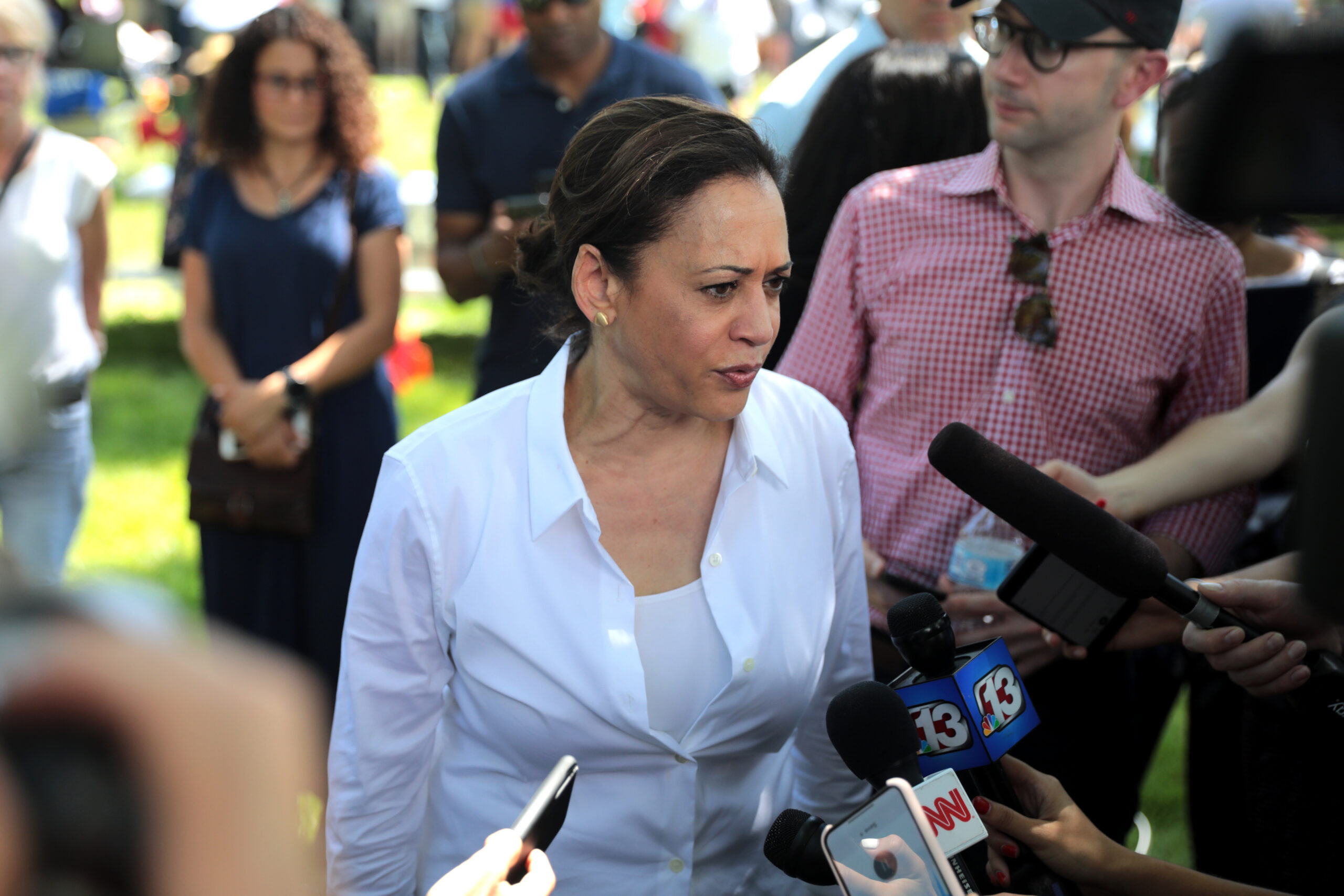In an unexpected announcement on Tuesday, California’s United States Senator Kamala Harris dropped out of the contest for the 2020 Democratic presidential nomination. The decision comes after months of polls showing the Senator in steady decline, and rumblings of serious discontent within her campaign team.
Unlike Montana’s Steve Bullock and Pennsylvania’s Joe Sestak, who also bowed out this week, Senator Harris was long considered one of the top tier of contenders for the Democratic nomination. Her campaign’s opening rally in Oakland drew 20,000 attendees (more than Barack Obama’s 2007 announcement), and early polling put her in a strong third place, behind only Bernie Sanders and Joe Biden.
Harris’ campaign had a breakout moment after the first round of televised debates in June. Harris memorably took Joe Biden to task over his problematic record on race, focusing particularly on comments surrounding segregationist senators and busing policies. Harris bested an unprepared Biden, and was widely regarded by swaths of pundits as the “winner” of the June debate.
Democratic activists also showed enthusiasm for Harris after that debate. Donations to the Harris campaign flooded in and her standing in the polls got a boost, while Joe Biden’s support amongst Democratic voters saw a decline.
However, Harris could not channel that momentum into a long term advantage.
Over the next few weeks, Harris’ standing in the polls dwindled, and Biden showed up for the second debate much more prepared to actually debate.
As the media’s focus drifted from Harris towards others candidates – particularly Elizabeth Warren and Pete Buttigieg – her campaign languished into listlessness.
In subsequent debates, she came across as unremarkable and even bizarre (like when she criticized Elizabeth Warren for not joining her in calling on Twitter to suspend Donald Trump’s Twitter account, a move that puzzled many people.)
Slumping poll numbers corresponded with slumping donations.
By the time autumn arrived, Harris’ campaign was “hemorrhaging” cash at an alarming rate, with online donations dropping off and big-money contributors turning to other candidates. In the most recent quarter, Kamala Harris For The People spent $1.41 for every dollar it raised.
With money drying up, Harris’ campaign was forced to change its approach, and began slashing its advertising budget and letting staff go in crucial areas, including New Hampshire. The campaign decided to focus on Iowa (where Harris recently spent the Thanksgiving holiday) out of necessity.
The strategic pivot did not yield results. A recent Iowa State University poll showed Harris in eighth place, with a meager two percent.

By the time Thanksgiving arrived, it seems that Harris’ campaign had nowhere to go: her best efforts in Iowa had not made her a top tier candidate, and money was getting tighter. Harris’ team was informed of her decision to drop out in an all-staff call, with the Senator sounding “distraught” over the phone.
In her exit letter on Medium, Harris made it clear that her campaign’s financial difficulties were the reason she dropped out: “I’ve taken stock and looked at this from every angle, and over the last few days have come to one of the hardest decisions of my life. My campaign for president simply doesn’t have the financial resources we need to continue.” In that letter, she also took a thinly-veiled swipe at Michael Bloomberg, who plans to personally finance a late bid for the nomination.
Money wasn’t Harris’ only problem. Despite having great potential, she struggled to build a base of support within the Democratic electorate.
At the outset of her campaign, Harris was expected to bring together a wide coalition of voters. Her identity as a woman of African and Asian descent put her at the center of the Democratic party’s demographic base, while her relatively young age (fifty-five, compared to the septuagenarians currently leading the Democratic pack) was seen as endearing to younger voters, another key group for the Democrats.
Harris added to this already-strong case by using her position on Senate committees to subject Donald Trump’s nominees and appointees to extensive grillings, designed in part to win over the Democrats’ Trump-loathing activist base.
She then used those exchanges, along with her record as a prosecutor and attorney general, to argue for her electability against Donald Trump, who she promised to “prosecute the case” against in the general election.
However, Harris’ coalition never came together. At least not in polling.
The black voters who were supposed to form Harris’ base of support largely stuck with Joe Biden, Barack Obama’s running mate and Vice President.
However, perhaps more important than Biden himself is the traditional caution and cynicism of black voters. Historically, black voters have gone for candidates who they believe white voters will be comfortable with, rather than those who stand for their values and identity. Even Barack Obama didn’t take the lead in black support until he had proved his appeal to white voters by winning Iowa in 2008.
Harris wasn’t helped by the fact that the 2020 contest has turned out to be a skirmish between the neoliberal wing of the party (represented chiefly by Joe Biden and Pete Buttigieg) and the progressive wing of the party (represented primarily by Elizabeth Warren and Bernie Sanders).
Harris tried to find the middle ground between the two wings, but often ended up promoting policy directions that did not make much sense.
Her confusing attempts to explain her “Medicare-for-All-but-not-really” policy framework are a particularly fine example of this.
Harris may not be the party’s nominee in 2020 for President, but she remains a United States Senator from the country’s most populous state, and will be talked about as a potential pick for Vice President, depending on who the nominee is. This presidential campaign did not end well, but that doesn’t mean Kamala Harris does not have a bright future. Her political future will be what she makes of it.


Comments are closed.